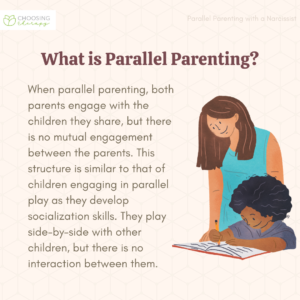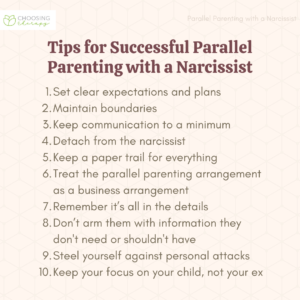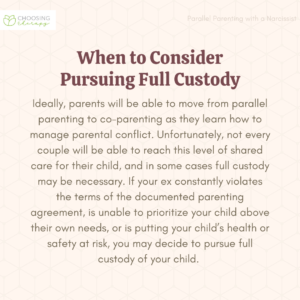In parallel parenting, interactions and communication between parents are extremely limited to only essential topics.1 Sharing parenting responsibilities with someone who is diagnosed with Narcissistic Personality Disorder (NPD) is difficult, and amicable co-parenting arrangements may be impossible to navigate. In these cases, parallel parenting may be the best option. Clear boundaries minimize the conflict and distress that a narcissistic co-parent creates for both the child and the other parent.
Have A Narcissist Parent?
Therapy can help you navigate the relationship as an adult. BetterHelp has over 20,000 licensed therapists who provide convenient and affordable online therapy. BetterHelp starts at $60 per week. Take a Free Online Assessment and get matched with the right therapist for you.
What Is Parallel Parenting?
When parallel parenting, both parents engage with the children they share, but there is no mutual engagement between the parents. This structure is similar to that of children engaging in parallel play as they develop socialization skills. They play side-by-side with other children, but there is no interaction between them.
In these cases, people will parent independently when the child is with them and in the way they feel is best for their child with no interference from the other parent. Each parent is able to practice the style of parenting that works best for them and their child. Conflict over parenting styles is eliminated, due to the boundaries that are in place in parallel parenting arrangements.
In parallel parenting, clear boundaries regarding interactions between parents are established. These include limits on the frequency of contact, the content of communications, and the timing of engagement. Parallel parenting is often the safest choice when the risk of conflict between parents is high, and a parent feels that no contact is the safest option for their own and their child’s well-being.2
Parallel Parenting vs. Co-Parenting
There are important differences between parallel parenting and co-parenting. In co-parenting, couples work together to develop a shared parenting plan for children. Agreement on behavior expectations, rules, discipline, and routines are encouraged, and parents work to ensure consistency across both parents’ homes for the child. Couples exhibit mutual respect and work as a team to ensure stability and support for their children.3
In parallel parenting, there is an absence of collaboration, but the presence of strict boundaries regarding communication between parents. Parents do not consult with one another about decision-making and don’t “check-in” with the other parent when they have the child. Parallel parenting generally involves detailed parenting plans that clearly outline pick-up times, locations, and schedules. Parents refrain from direct communication with one another, and do not intervene or comment on the other parent’s parenting behaviors.
10 Tips for Successful Parallel Parenting With a Narcissist
Narcissistic Personality Disorder is hallmarked by qualities that are not well suited to effective parenting or co-parenting.4
A narcissist’s inflated ego and desire to control others can make co-parenting with a narcissist extremely difficult. Thus, by opting for a parallel parenting model, there is less space for damaging conflict between parents in front of the child.
Parents who have spent months trying to negotiate parenting details with a narcissist understand that this struggle can feed into the narcissist’s need for attention. It also reveals to the narcissist the areas where the other parent is vulnerable, through assessing which parenting decisions or rules the other parent works hardest to determine. This knowledge fuels the narcissist in their efforts to take control, and to keep the other parent off-balance in the negotiations.
By moving towards a parallel parenting arrangement, the parent with NPD will lose the power to try and control the parenting arrangements, or to try and move the focus to themselves. Parallel parenting allows you to step back from the warzone and focus on your relationship with your child, not the other parent.
Here are 10 tips for successful parallel parenting with a narcissist:
1. Set Clear Expectations & Plans
The key to success in parallel parenting is having clear boundaries in place that you are willing to enforce. Parenting agreements should be in writing and on file with your legal representative. If shared custody is part of the arrangement, the dates, times, and locations for transferring custody should be spelled out. In addition, clear consequences for not abiding by the plan should also be described in detail in the parenting plan. Consequences should address such steps as involving law enforcement personnel if the child is not returned at the specified time to cancellation of visiting rights for a specified period if the parent fails to show up as scheduled.
2. Maintain Boundaries
Healthy boundaries are helpful in maintaining even cordial relationships, but they are absolutely key to effective parallel parenting practices. Don’t try to overstep the limits of the agreement in order to check in on your child or observe your ex with your child. Boundaries are important for both parents to honor if they are to be of use to your child’s welfare. As hard as it may be, parallel parenting means that you agree not to try and tell your ex how they should parent your child. Boundaries are only effective when both parties honor the limits created.
3. Keep Communication to a Minimum
Parallel parenting requires that each parent step back from as much engagement with one another as possible. This minimizes conflict between parents and, ideally, eliminates parental conflict in front of the child. Be extremely careful in any communication with an ex with NPD and stick to facts, not feelings. When your child is in their care, do your best not to attempt communication. The goal of parallel parenting is to create an environment as free from conflict as possible for your child; by limiting your communications with the narcissist to times when the child is not present, you are working towards that same goal.
4. Detach From the Narcissist
Recognize that the best “rule of engagement” is to avoid engagement. Narcissists are experts at using others’ words and actions against them. By avoiding contact, you are protecting yourself from potential reputational damage–most importantly, you are protecting your child.
Are you dating or married to a narcissist?
Whether you’re trying to move on or rebuild a relationship, a licensed therapist can guide you. BetterHelp has over 20,000 licensed therapists who provide convenient and affordable online therapy. Visit BetterHelp
Is your mother, father, or family member a narcissist?
Being raised by a narcissist can damage your confidence and self-esteem. A therapist from Online-Therapy can help you both heal from the past, and manage the relationship to be less harmful. Counseling starts at $50 per week. Try Online-Therapy
5. Document, Document, Document
In parallel parenting with an ex with NPD, the three most important tasks to ensure rules are followed and boundaries are maintained are to document, document, document. Make sure any interactions, no matter how minor, are documented.5
Keep a log of all interactions and file this information in a secure place. Time stamps can be helpful, too. You want to avoid any future, “I said/they said” situations going forward.
6. Treat the Parallel Parenting Arrangement as a Business Agreement
In business agreements, each detail is clearly laid out, and emotions are not a part of the equation. Use a business mentality to assess the fairness of the parallel parenting arrangement. Think of it as a contract between you and your child’s other parent and make sure that your child’s welfare is a protected interest and the clear goal of each decision outlined in the document.
7. Remember It’s All in the Details
Don’t leave anything to chance, as people with NPD are experts at taking advantage of others’ vulnerabilities and oversights. Seldom is being nitpicky as important as it is when hammering out a parallel-parenting agreement with a narcissist. Focus on each detail that’s involved in the transfer and care of your child from your care to the other parent and include the acceptable parameters in the agreement.5
Brainstorm as many “worst case scenarios” or “what could go wrong?” possibilities and outline the remedies that would be acceptable. Narcissists never hesitate to put their own best interests above their children’s, so every detail in the agreement matters, as well as the consequences for straying from the plan.
8. Don’t Arm the Enemy
Don’t provide the narcissist with “ammunition” to use against you. Avoid engaging in verbal skirmishes in which your words may be twisted or used against you. Before you hit “send” on any electronic communication—whether it’s a text message or an email, pause and re-read the message as if it were being read aloud in a courtroom. If there’s any room for misinterpretation, you are potentially arming your ex against you and your child.
9. Steel Yourself Against Personal Attacks
The suggestion to “be a gray rock” is described as the best way to respond to personal attacks, and it’s a skill worth learning. We teach our children to ignore name calling and teasing and we should follow our own advice when a person with NPD is trying to bait us. Individuals with NPD feed on the reactions they get from others, so by refusing to react to their gibes or baiting, we are cutting off their narcissistic supply. We are also modeling to children how to withstand efforts to provoke us into reacting.
10. Keep Your Focus on Your Child, Not Your Ex
In conflict-heavy separations, a lot of emotional energy gets sucked up by the other parent, leaving little energy for other relationships. Make sure you conserve your emotional resources so that you can focus on parenting your child, rather than obsessing about the parenting practices of your ex. Be the parent the child knows they can trust and the one who does what they say they will and provides unconditional love.
How Can Therapy Help when Parallel Parenting With a Narcissist?
Narcissistic behavior can take a significant emotional toll, especially on those who have been in close relationships with the narcissist. The gaslighting that narcissists engage in with their partners doesn’t end when they split up; it can actually grow worse. Although parallel parenting is designed to minimize conflict and extricate you from engagement with your ex, being able to let go of the need to oversee or control your ex’s engagement with your child may take some effort.
Professional therapists are trained to help you process past experiences and develop new skills to better manage future interactions with your ex. Therapists can provide an objective perspective on your parallel parenting arrangement, as well.
Therapy can also be valuable for your child, too. Therapy isn’t just about solving problems–it can also help prevent problems that may appear later in life. Self-esteem, self-confidence, and independence are traits that narcissistic parents try to undermine in their children4; learning skills to build up these traits can help children grow and thrive as they mature.
When to Consider Pursuing Full Custody
Ideally, parents will be able to move from parallel parenting to co-parenting as they learn how to manage parental conflict. Unfortunately, not every couple will be able to reach this level of shared care for their child, and in some cases full custody may be sought. If your ex constantly violates the terms of the documented parenting agreement, is unable to prioritize your child above their own needs, or is putting your child’s health or safety at risk, you may decide that enough is enough and choose to pursue full custody of your child.
Be prepared to show the court evidence of your greater suitability to parent your child, as well as evidence of your ex’s failure to effectively care for your child. Evidence of neglect, narcissistic abuse, lack of supervision, or substance misuse are often key factors in the decision to award full custody.
Final Thoughts
Sharing parenting responsibilities after a separation is challenging, but when your ex has NPD, the challenges multiply exponentially. Opting for a parallel parenting arrangement allows you to gain some distance from your ex, as well as set up parameters that limit the ability of your ex to interfere in quality time with your child. Those with NPD believe that they are entitled to special treatment and that limits do not apply to them. Creating a detailed plan that includes clear consequences for failure to follow the agreement can help to ensure that your child’s welfare is safeguarded, your peace of mind is protected, and the narcissist’s demands are kept in check.
Additional Resources
To help our readers take the next step in their mental health journey, Choosing Therapy has partnered with leaders in mental health and wellness. Choosing Therapy is compensated for marketing by the companies included below.
Online Therapy
BetterHelp – Get support and guidance from a licensed therapist. BetterHelp has over 20,000 therapists who provide convenient and affordable online therapy. Complete a brief questionnaire and get matched with the right therapist for you. Get Started
Online-Therapy – Online-Therapy.com provides a weekly live video session, unlimited text messaging, and self-guided activities like journaling. Starting at $64 per week, this is one of the most affordable options for CBT therapy. Try Online-Therapy
Narcissist Recovery Support Group
Circles – Anytime, anonymous, and free. Never feel alone during life’s greatest challenges. Drop-in to live conversations and share thoughts, ask questions, or learn from others on the same journey. Join Circles Now
Narcissism Newsletter
A free newsletter from Choosing Therapy for those recovering from narcissistic abuse. Get helpful tips and the latest information. Sign Up
Choosing Therapy Directory
You can search for therapists by specialty, experience, insurance, or price, and location. Find a therapist today.









